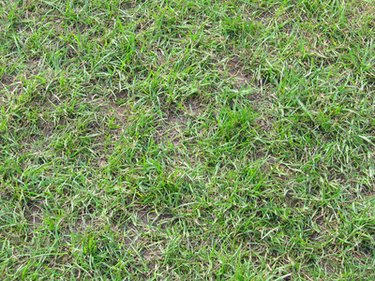
Dethatching can be one of the simplest, most effective ways to revive a lawn. If you've noticed that your lawn continues to look brown regardless of how much or often you water it, it might be time to dethatch.
Dethatching
Video of the Day
Dethatching simply is the removal of the thatch layer. Thatch removal can be accomplished manually, with a dethatching rake—which can be time-consuming for any but the smallest areas of lawn—or more quickly and effectively with a gas-powered power rake.
Video of the Day
What Is Thatch?
Thatch looks like a layer of brown, matted grass and often is mistaken for an accumulation of grass clippings. However, thatch is the layer of rhizomes, crowns and stems left behind from dead grass.
Why Dethatch?
According to David Mellor, master groundskeeper of Fenway Park in Boston, Massachusetts and the author of "The Lawn Bible," "Having some thatch on your lawn is good—too much is bad." If your lawn has more than 1/2 an inch of thatch, dethatching will allow more water, fertilizer and air to reach the soil and grass roots, resulting in a healthier lawn.
Dethatching Rake
Unless you own a power rake, a manual dethatching rake can be a convenient tool for tackling small areas of grass. The crescent-shaped blades of a dethatching rake are heavy and sharp enough to cut through and pull up the thick, tough thatch layer.
Power Rake
A power rake is roughly the same size as a lawn mower and just as easy to use. It has several rows of sharp vertical reels that catch onto and pull up thatch both effectively and efficiently.